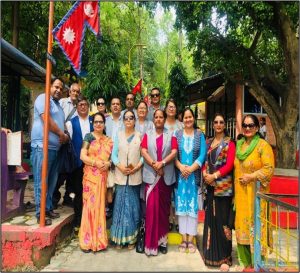 The dialogue was chaired by Honorable Ananda Shrestha and attended by distinguished parliamentarians, forest and environment experts, and community representatives. The main highlight of the program was the presentation by Dr. Sindhu Dhungana, who conducted a comprehensive gap analysis of the Bagmati Province Forest Act in the light of National Forest Policy, 2019, Federal Forest Act of 2019 and the overarching aspirations of the Nepalese people to achieve inclusive prosperity from forest resources. Dr. Dhungana moderated the session and shared key findings emphasizing the legal provisions related to forest, water, and environmental governance in Nepal. He underscored the importance of balancing conservation efforts with sustainable, production-oriented forest management that can generate economic benefits while ensuring environmental protection.
The dialogue was chaired by Honorable Ananda Shrestha and attended by distinguished parliamentarians, forest and environment experts, and community representatives. The main highlight of the program was the presentation by Dr. Sindhu Dhungana, who conducted a comprehensive gap analysis of the Bagmati Province Forest Act in the light of National Forest Policy, 2019, Federal Forest Act of 2019 and the overarching aspirations of the Nepalese people to achieve inclusive prosperity from forest resources. Dr. Dhungana moderated the session and shared key findings emphasizing the legal provisions related to forest, water, and environmental governance in Nepal. He underscored the importance of balancing conservation efforts with sustainable, production-oriented forest management that can generate economic benefits while ensuring environmental protection.
A central theme of Dr. Dhungana’s presentation was the recognition and integration of the rights of marginalized groups particularly Indigenous Peoples and Local Communities (IPLCs), women, and Dalits into forest policies and law-making processes. He also highlighted the significance of international agreements, such as CBD and CITES (Convention on International Trade in Endangered Species of Wild Fauna and Flora), in regulating wildlife trade, which are essential for biodiversity conservation, while also ensuring the rights of IPLCs over the benefits form biodiversity and genetic resources. Additionally, Dr. Dhungana introduced the concept of the Triple Planetary Crisis, which interconnects global challenges of climate change, biodiversity loss, and pollution, emphasizing the overlapping impacts these crises have on forest governance, the broader environment and capacity of natural resources to contribute to socio-cultural and economic prosperity in harmony with nature
Furthermore, Dr. Dhungana illustrated the substantial economic potential of Nepal’s forest sector by presenting projections for 2030. He highlighted that timber production, government revenue, employment opportunities, and women’s leadership roles are all expected to grow significantly, showcasing the sector’s role in national development. To harness this potential, Dr. Dhungana recommended amending Nepal’s National Forest Policy, 2019 and the Federal Forest Act, 2019 to prioritize sustainable forest management and eco-tourism, promote community forestry with greater autonomy and private sector participation, and empower provincial and local governments with clear authority and accountability.
In addition, Dr. Dhungana proposed the establishment of a national body to regulate carbon trading, with appropriate legal procedures and mechanisms, to ensure that environmental initiatives contribute to both ecological conservation and community benefits. He also recommended formalizing these reforms through an overarching Environment and Climate Change Act, which would help streamline governance, avoid institutional overlaps, and support the inclusive management of Nepal’s valuable forest resources.
4. Key Discussion Points
After Dr. Dhungana’s presentation, the floor was open for recommendations on the gaps in the Forest Act amendment. The interactive dialogue allowed participants to express their views with the consent of each right-holder.
During the discussion session, several parliamentarians and stakeholders shared valuable insights and recommendations for the amendment of the Bagmati Province Forest Act. Honorable Laxman Lamsal raised concerns over Nepal’s continued import of timber despite the country’s abundant forest resources, emphasizing the need for better utilization of local forests.
Honorable Maya Devi Sharma wondered why UPVC and aluminum have been used while there is abundant potential of harvesting timber in Nepal. She recommended that the amended law should address the barriers to cut down trees sustainably. Hon. Masina Khadka, former Minister raised the issues of forest governance and suggested that some timber species such as Alnus has been harvested significantly but are not used with a proper processing. So, she highlighted the need to add the provision for value addition of forest products in the new law. Hon. Balkumari Bishwakarma underscored the importance of forest products to some professional castes, such as Dalits for their livelihoods. Therefore, their rights over the forest resources for their livelihoods need to be explicitly articulated in the law amendment. Hon. Shanta Dhakal stated that there is high potential of internal tourism in community forestry. Some tourism products such as walking and hiking trail, picnic spot, jeep lines and view towers need to be included in the operation plans of the community forest, for which the new amendment should provide a conducive legal environment. Hon. Maili Tamang emphasized the role of community forests in watershed protection. However, local forestry officials are not allowing CFUGs to construct water recharge ponds in the community forestry. The amended law should support such activities in a way that the recharge ponds can also contribute to mitigate disasters such as wild fire. Hon. Gyan Bahadur Tamang highlighted the values of pine trees in economic, ecological and cultural terms. This species needs to be promoted for economic prosperity although this species is highly contested terms of water depletion in the area. However, he argued that there are no sufficient scientific evidences to back this claim. Hon. ……highlighted the problems faced by indigenous peoples in recent forest management practices even in community forests. He added, for example, the Yak herders, potters and Chiuri cultivators are in trouble since they are prohibited to use resources from forests. Their rights over these resources need to be secured through the legal improvement.
Honorable Yamuna Devi Shrestha highlighted the critical link between forests and water conservation, recommending the creation of water recharge ponds within community forests to help minimize disaster risks such as wildfires. Honorable Thula Thami fully supported the inclusion of Indigenous Peoples and Local Communities (IPLCs) in legal reforms to ensure their rights and participation in forest governance. Adding to the discussion, Mr. Sadhuram Chaulagain,representing community forest user groups,stressed the importance of enterprise development and the proper utilization of forest products to enhance community livelihoods. Similarly, Honorable Urmila Nepal called for the planting of beneficial trees that can support both ecological balance and the economic upliftment of local and indigenous communities, while also advocating for women’s empowerment and greater involvement in natural resource management. Lastly, Honorable Bharati Kumari Pathak emphasized the equitable use of forest resources, ensuring that marginalized communities are the primary beneficiaries of forest-based opportunities and development.
5. Conclusion
The Forest Policy Dialogue Program successfully brought together key stakeholders to deliberate on the necessary amendments to the Bagmati Province Forest Act, with a strong focus on promoting inclusion, sustainability, and economic development. The program underscored the importance of creating legal and policy frameworks that are not only conservation-driven but also inclusive of the rights and participation of Indigenous Peoples, Local Communities (IPLCs), women, and marginalized groups who depend on forest resources for their livelihoods and cultural identity.
Through his presentation, Dr. Sindhu Dhungana highlighted the need to shift from purely conservation-focused forest policies to a sustainable, production-oriented management approach. This would involve empowering local communities and encouraging the development of forest-based enterprises and eco-tourism while maintaining environmental integrity. The discussions during the program brought several critical issues to the forefront, including the underutilization of Nepal’s own forest resources, the integration of water conservation measures such as water recharge ponds within community forests, and the need to enhance women’s leadership roles in natural resource management and economic development.
Participants also emphasized the importance of greater decentralization and the empowerment of provincial and local governments to ensure effective forest governance tailored to local needs. Another key recommendation was the establishment of robust mechanisms for carbon trading and environmental regulation, ensuring that Nepal’s forests contribute meaningfully to both global climate initiatives and local community benefits.
The program concluded with a shared understanding of the urgency to address these legal and policy gaps through comprehensive legislative amendments and reforms. These efforts aim to ensure environmental sustainability, social inclusion, and economic prosperity for all stakeholders. Honorable Ananda Shrestha expressed sincere gratitude to all participants for their meaningful contributions and encouraged ongoing collaboration to bring about the necessary changes in forest governance and policy. He also made a commitment to incorporating all the suggestions in the ongoing amendment of Forest Act of the province to the best possible extent.
Key highlighting points that need to be addressed in the amendment:
• Points that need not to be included:
1. Definition of silvicultural system need not to be included in Province Forest Act.
2. Tax and/or any sort of extra charge on selling of the forest products from Community Forest should be removed.
3. The provision of block forest has already been removed from the Federal Forest Act, So, it need not to be included in Bagmati Province Forest Act.
4. The provision of harmful substances in agricultural system need to be removed from the Province Forest Act since it may cause negative impact in Federal Forest Act.
5. The inclusion of term community-based forest user group in 22(2) is inappropriate. Instead, the term Community Forest User Groups (CFUGs) should be included.
6. The provision of merging small community forests should be prohibited since it may cause demotivation to the local community people leadership capacity along with its impact on international level as well where CF model of Nepal has played an exemplary impact.
7. There is a provision that all the registered community forest comes under national forest in Federal Forest Act. So, there is no need for this provision to be included in Province Forest Act.
• Provisions that need to be added:
1. There should be provision of ensuring at least 50% women in CFUG including them in executive position either Chairperson or Secretary and either Vice-Chairperson or Treasurer.
2. The proportional and inclusive representation of Indigenous People, marginalized people should be ensured in the CFUG based on total population of households in the group.
3. There should be provision of allocating at least 50% of total income in women empowerment, poverty alleviation and enterprise development sector; remaining 25% of income should also prioritize in women sector while doing any sort of programs.
4. The traditional practices of Indigenous People of CFUG should be included and implemented in the operational plan.
5. There should be provision of allowing the registration of enterprises in the name of CFUGs.
6. Marginalized households who rely on their traditional practices using forest products should be provided free of charge in order to preserve those traditional practices.
7. There should be provision of providing certain land of community forests in lease to Dalit, marginalized people especially women for their livelihood upliftment and enterprise development.
8. There should be provision of establishing a collective enterprise by developing business plan by nearby community forests for effective and productive management.


